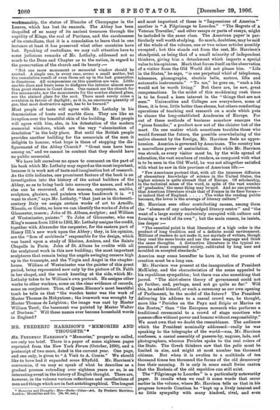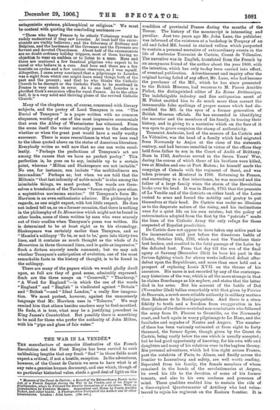MR. FREDERIC HARRISON'S "MEMORIES AND THOUGHTS."*
Mn. FREDERIC HARRISON'S "Memories," properly SO called, are only too brief. There is a paper of some eighteen pages reprinted from the New York Forum (October, 1890), and a postscript of two more, dated in the current year. One page, and one only, is given to "A Visit to A. Comte." We should like to have had it expanded some fiftyfold. Mr. Harrison's conversion, if we may so speak of what he describes as a gradual process extending over eighteen years or so, is an interesting event in the history of English thought. There are, however, in the volume various reflections and recollections of men and things which are in fact autobiographical. The longest • Memories and Thoughts Men—Books—Cities—Art, By Frederic Harrison. London: Macmillan and Co. gia. 6d. net.' and most important of these is "Impressions of America" another is "A Pilgrimage to Lourdes." "The Regrets of a
Veteran Traveller," and other essays or parts of essays, might be included in the _same class. The American paper' is par- ticularly well worth studying. So much, doubtless, may be said of the whole of the volume, one or two minor articles possibly excepted ; but this stands out from the rest, Mr. Harrison's standpoint, as being that of a small minority of independent
thinkers, giving him a detachment which imparts a special value to his opinions. Much that forces itself on the observation
of a visitor from the Old World did not please him. "Life in the States," he says, "is one perpetual whirl of telephones, telesemes, phonographs, electric bells, motors, lifts and automatic instruments." "To me," he goes on, "such a life would not be worth living." But there are, he saw, great compensations. In the midst of this maddening rush there is to be found a keen interest in the "things that are not seen." Universities and Colleges are everywhere, some of them, it is true, little better than shams, but others conducting operations of teaching and research on a scale which puts to shame the long-established Academies of Europe. For out of these methods of business somehow emerges the "pious founder," a product now not of the cloister but of the mart. On one matter which sometimes troubles those who would forecast the future, the possible overwhelming of the native element by the foreign, Mr. Harrison feels no appre- hension. America is governed by Americans. The country has a marvellous power of assimilation. But while Mr. Harrison was struck, as every visitor must be, by the wide spread of education, the vast numbers of readers, as compared with what is to be seen in the Old World, be was not altogether satisfied with what he saw in this province of American life :—
" Few Americans pretend that, with all the immense diffusion of elementary knowledge of science in the United States, the higher science is quite abreast that of Europe. Of scholarship, in the technical sense of the word, in spite of the vast number of 'graduates,' the same thing may be said. And no one pretends that American literature rivals that of France in its finer 'forms—
or indeed that of England The wider the reading publie becomes, the lower is the average of literary culture."
Mr. Harrison sees other contributing causes, among them the "absence of any acknowledged literary centre" and "the want of a large society exclusively occupied with culture and forming a world of its own"; but the main reason, he insists, lies deeper :—
" The essential point is that literature of a high order is the product of long tradition and of a definite social environment Millions of readers do not make it, nor myriads of writers, though they read the same books and use the same language and think the same thoughts. A distinctive literature is the typical ex- pression of some organised society, cultivated by long user and moulded on accepted standards."
America may come hereafter to have it, but the process of creation must be a long one.
Mr. Harrison was present at the inauguration of President McKinley, and the characteristics of the scene appealed to his republican sympathies ; but there was also something that jarred. "The shirt-sleeve theory of government could not go further, and, perhaps, need not go quite so far." Will this, he asked himself, or such a ceremony as our own opening of Parliament, be the model of the future ? The President delivering his address to a casual crowd was, he thought, more like "Pericles on the Pnyx and Scipio or Marius on the Rostra," than "the European monarch who performs a traditional ceremonial to a crowd of stage courtiers who possess office without power and honour without responsibility." We must own that we doubt the resemblance. The audience which the President nominally addressed—really he was speaking to the telegraphs of the world—was, Mr. Harrison confesses, a casual assembly of passers-by, negroes, lads, and photographers, whereas Pericles spoke to the real rulers of the State. The Greek thinkers saw that the polls must be limited in size, and might at most number ten thousand citizens. But when it is swollen to a multitude of ten thousand times ten thousand the forms of the old democracy lose their meaning. It is only in some small Swiss canton that the Ecclesia of the old republics can still exist.
' The "Pilgrimage to Lourdes" is a particularly noteworthy paper. It recalls when we read it some words that occur earlier in the volume, where Mr. Harrison tells us that in his progress towards Comtism he "kept up a lively interest and no little sympathy with many kindred, rival, and even
antagonistic systems, philosophical or religious." We must be content with quoting the concluding sentences :- "Those who fancy France.to be utterly Voltairean would be rudely =deceived if they saw Lourdes. At least half the excur- sionists are visibly believers ; and the fishermen of Brittany and Belgium; and the herdsmen of the Cevennes and the Pyrenees are fervent and devoted Churchmen. About half of the excursionists are no doubt ordinary holiday trippers, most of them having no objection to wear an emblem or to listen to a mass. Here and there are scattered a few fanatical pilgrims who expect to be cured or who believe in a cure. And here and there are a few tourists on cycles and a few curious observers, as I was myself. Altogether. I came away convinced that a pilgrimage to Lourdes was a sight from which one might learn many things both of the past and the present; and that he who thinks the Catholic Church to be decrepit or the Catholic Faith to be moribund in France is very much in error. As to one half, Lourdes is a glorified Cook's excursion office for rural France. As to the other half, it is a very solid and thriving phase of the revived Catholic Church."
Many of the chapters are, of course, concerned with literary subjects, and the poetry of Lord Tennyson is one. "The Burial of Tennyson" is a paper written with no common eloquence, worthy of one of the most impressive ceremonials that even the Abbey of Westminster has witnessed. From the scene itself the writer naturally passes to the reflection whether or when the great poet would have a really worthy successor. There is some resemblance in what we here read to the ideas quoted above on the status of American literature. Everybody writes so well now that no one can write excel- lently. "Perhaps the perfections of Tennyson's art are among the causes that we have no perfect poetry." This perfection is, he goes on to say, imitable up to a certain point, whereas "Milton and Shakespeare are not imitable." No one, for instance, can imitate "the multitudinous sea incarnadine." Perhaps so; but when we are told that the Mikado "that last infirmity of noble minds" is also among the inimitable things, we must protest. The words are them- selves a translation of the Tacitean " famae cupid° quae diem a sapientibus novissima exuitur." Of Tennyson's form Mr.
Harrison is an even enthusiastic admirer. His philosophy he regards, as one might expect, with but little respect. He does not indeed tell us, as on a former occasion, that there is nothing in the philosophy of In Memoriam which might not be found in other books, some of them written by men who were scarcely out of their cradles when Tennyson's poem was written. He is determined to be at least right as to his chronology. Shakespeare was certainly earlier than Tennyson, and so "Hamlet's soliloquy 'To be, or not to be,' goes into thirty-two lines, and it contains as much thought as the whole of In Memoriam in three thousand lines, and is quite as impressive." Such a dictum scarcely needs comment; -but we may ask whether Tennyson's anticipation of evolution, one of the most remarkable facts in the history of thought, is to be found in the soliloquy.
There are many of the papers which we would gladly dwell upon, so full are they of good sense, admirably expressed. Such are the three essays on "Cromwell," " Thackeray," "A Word for England "—in which the use of the words "England" and "English" is vindicated against "Britain" and "British "—and "Ideal London," a really fine imagina- tion. We must protest, however, against the unmannerly language that Mr. Harrison uses in "Tobacco." We may remind him that others besides smokers may be foul-mouthed.
He finds, it is true, what may be a justifying precedent in King James's Counterblast. But possibly there is something
to be said for those who prefer the authority of John Milton, -with his "pipe and glass of fair water."



































 Previous page
Previous page